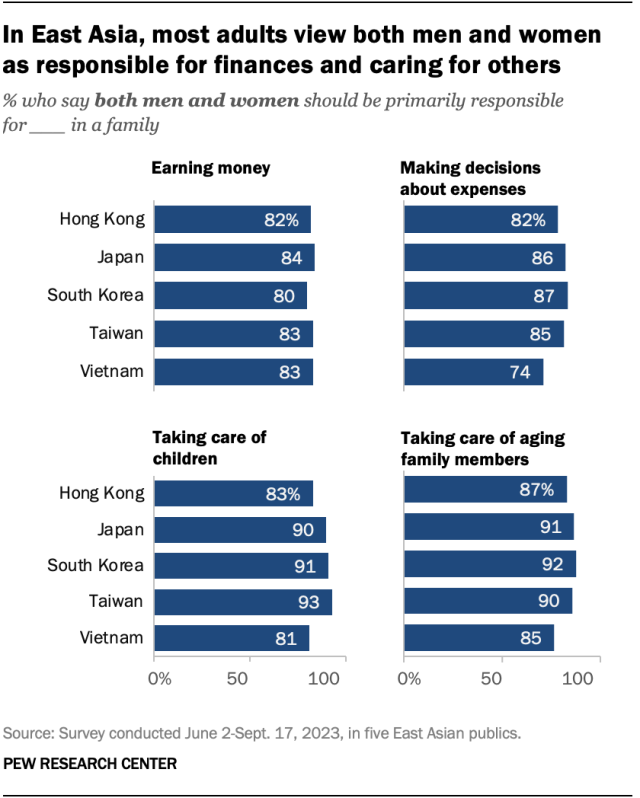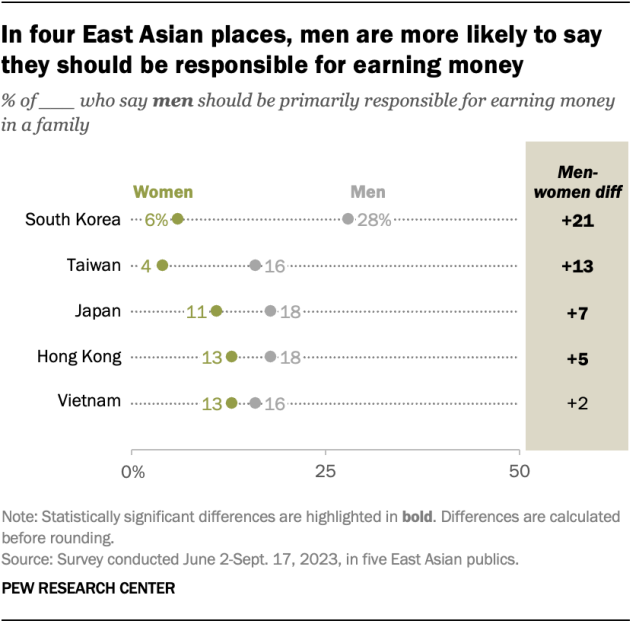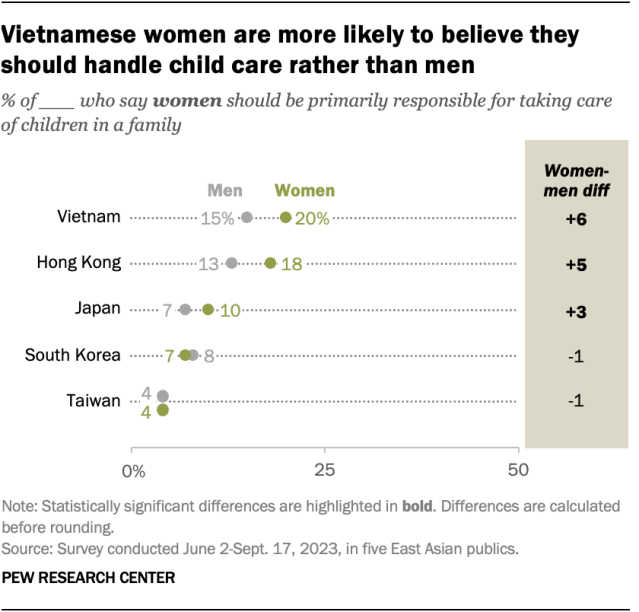
In parts of East Asia, large majorities say men and women should share familial responsibilities, according to a Pew Research Center survey conducted June 2-Sept. 17, 2023. The responsibilities we asked about are earning money, making decisions about expenses, taking care of children and taking care of aging family members.
The data used in this analysis is part of a larger Pew Research Center project examining religion, spirituality and nonreligion in East Asia. The five places this analysis covers are Hong Kong, Japan, South Korea, Taiwan and Vietnam.
Several other places that are generally considered part of East Asia are not included due to survey fieldwork limitations. For example, China does not currently allow non-Chinese organizations to conduct surveys in the mainland, and public opinion surveys are not possible to conduct in North Korea. While surveys can be conducted in Mongolia, the share of people we can reach does not meet the Center’s threshold to report population-level estimates because of the nomadic nature of large segments of the population.
Pew Research Center conducted this analysis to assess how adults in East Asia view gender roles for four common familial responsibilities.
Data comes from a survey of 10,390 adults (ages 18 and older) among five places in East Asia: Hong Kong, Japan, South Korea, Taiwan and Vietnam. In the first four places, interviews were conducted over the telephone. In Vietnam, interviews took place face-to-face. All surveys were conducted between June 2 and Sept. 17, 2023.
This survey is part of the Pew-Templeton Global Religious Futures project, which analyzes religious change and its impact on societies around the world.
Respondents were selected using probability-based sample designs. The data was weighted to account for different probabilities of selection among respondents and to align with demographic benchmarks for adult populations.
Here are the questions used for the analysis, along with responses, and the survey methodology.

Around three-quarters or more in Hong Kong, Japan, South Korea, Taiwan and Vietnam say men and women should share responsibility for every task asked about. On some measures, like earning money, 80% or more in each place say this.
To the degree that people feel one gender is more responsible for certain tasks, though, people are more likely to see men as responsible for earning money. The share saying this ranges from 10% in Taiwan to 17% in South Korea.
Adults are also more likely to see women as responsible for taking care of children – 4% to 18% of people in each place say this.
Differences by gender

Although large majorities say men and women should share most responsibilities, there are some gender differences in people’s responses.
For example, in four of the five places surveyed, men are more likely than women to say men should be primarily responsible for earning money. Taiwan and South Korea show the widest gender gap – there is a 21 percentage point difference in South Korea and a 13-point difference in Taiwan.
There are similar patterns when it comes to managing finances. In South Korea, Hong Kong and Taiwan, men are slightly more likely than women to say men should be primarily responsible for handling expenses.

In some places, women are slightly more likely than men to say that women should be primarily responsible for child care. For example, in Hong Kong, 18% of women believe that women should have this responsibility, compared with 13% of men.
Similarly, women in Vietnam, Hong Kong and Japan are slightly more likely than men to say women should be responsible for taking care of elderly family members.
Differences by age, education and marital status
Adults ages 18 to 34 are slightly more likely than older adults to say men and women should share the four familial responsibilities we asked about. For example, in Taiwan, 88% of younger adults say men and women should share responsibility for earning money, compared with 80% of those ages 35 and older.
Similarly, adults with higher levels of education are more likely than those with lower levels of education to say men and women should share responsibility for each of these tasks. Those who have never been married are also more likely than those who have married to say this.
Note: Here are the questions used for the analysis, along with responses, and the survey methodology.


